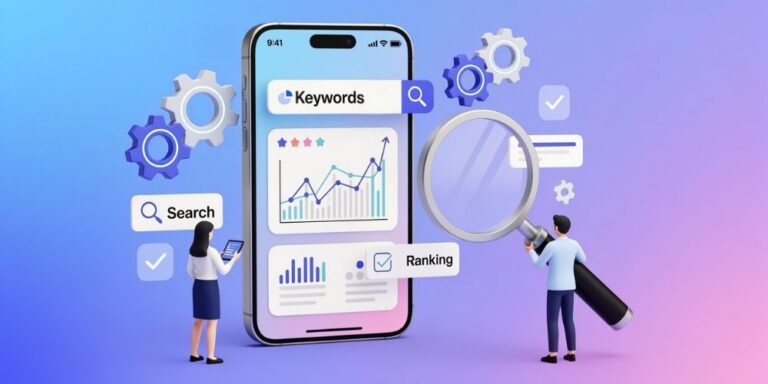ASO localization goes far beyond mere translation. It is the process of polishing a mobile app to resonate with the cultural, linguistic, and practical context of a chosen local audience. It plays a crucial role in expanding the reach of an app, global-wise. According to a study conducted by Google and Boston Consulting Group, app localization can bolster revenue by a staggering 25 percent.
Table of Contents
By tailoring your app’s content, layout, and functionality to suit local audiences, you can increase app engagement and increase app installs, skyrocket customer satisfaction into stardom, and increase app conversion rate. Effective localization enables you to profit from new markets, foster client retention, and achieve significant financial gains. In this article, we’ll cover the significance of app localization, dwell upon choosing countries for localization, as well as touch upon the two vital steps to take when localizing your product with Asolytics.
The Main Idea Behind ASO Localization App
Let’s start with the meaning behind locale. A locale is a blend of the language and the country it’s used in. Bear in mind that there are countries with multiple locales. For instance, the USA has 9 locales in the App Store.
With that said, when localizing your app, you’ll form a semantic core for a certain country, as well as promote and distribute it around that country. However, if this country has multiple languages, you’re going to need to optimize your app for multiple locales. That’s pretty much the foundation underneath the significance of app localization.
5 Reasons Why ASO Localization Is Important for App
App localization is of paramount importance in today’s global market. Many ASO services, like Keyapp tools, recommend you collect keywords for over 100 countries for iOS and Android apps. Why? Here are five crucial reasons why the app better be localized for the different regions:
- Revenue Boost. By customizing your app to suit the needs of local audiences, you can profit from new markets and attract a larger customer base. A localized app enhances the engagement of more users, leading to higher conversion rates and boosted sales.
- Enhanced Intuitiveness. App localization allows users to interact with the app in their native language, taking the intuitiveness and user-friendliness of your product to the next level. By providing localized content, adapting cultural context, and incorporating local payment solutions, you can enhance the user experience and build rapport with your audience.
- Expanded Market Reach. App localization grants your business a chance to enter new business scenes and expand its global presence. By breaking down linguistic barriers and catering to local specificities, you get to attract a diverse range of users. This opens up opportunities for growth, increases brand visibility, and helps you stay ahead of your competition.
- Cultural Sensitivity. Localization ensures that the app’s content, visuals, and messaging align with the cultural peculiarities of the target market. This includes displaying cultural diversity and thus contributing to long-term relationships with your customers.
- Competitive Advantage. In a crowded app marketplace, localization can provide a significant competitive advantage. By investing in app localization, you show your commitment to serving the needs of local users, distinguishing yourself from competitors who offer generic, one-size-fits-all solutions. This differentiation can attract more users, boost app downloads, and establish a strong market position.
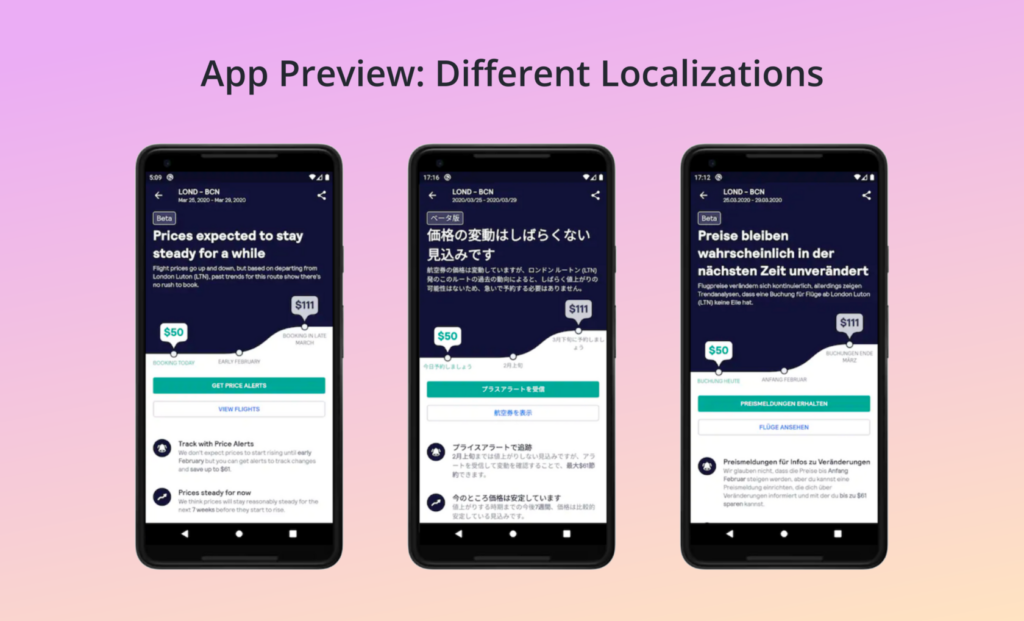
Tip. No matter what service you use, pay attention to the country you choose. It represents the main market for your app promotion. In different countries, the same keyword would have different efficacy. Thus, your app will be ranked differently with the same keyword. In the Keyapp example, you can see that top keywords differ for different countries.

Country-Specific Aspects of Effective Localization
- Linguistic Aspect. Translating your product’s content into the target languages is crucial.
- User Interface. The app’s interface should be customized to cater to diverse regions. This may involve adjusting date layouts or currencies, among other elements.
- Cultural Diversity. Cultural differences should also be considered during localization.
- Compliance with Legal Regulations. Certain countries may have legal requirements that govern the usage of mobile apps. It is essential to stay informed about these regulations and ensure compliance.
- Tailored Marketing. Developing localized marketing materials, such as website translations, advertisements, and social media posts, is necessary for effective promotion.
How to Choose Countries for ASO Localization: 10 Steps
According to Business of Apps, China, Japan, and the US are the 3 main markets for top-grossing apps, accounting for about eighty percent of all income generated on the app store. With that said, when choosing countries to target in the context of Google Play vs App Store optimization localization, follow these 10 vital steps:
- Explore the key languages by a total number of speakers.
- Learn about the most-used languages on the Internet.
- Research the top countries by online sales.
- Take time to study the list of leading countries in terms of retail e-commerce sales growth.
- Explore the top countries by App Store downloads.
- Study the top countries by app store profits.
- Dive deeper into the topic of the cultural framework of the countries you’re about to opt for.
- Study the country-specific legal regulations in terms of the usage of mobile apps.
- Explore the best-suiting promotional strategies for the countries you have your eyes on.
- Research the iOS vs Android app localization specificities.
Top 10 countries for app localization
If you analyze all the above-listed criteria, you may come to an important conclusion that the USA, UK, Australia, Japan, China, India, Russia, South Korea, Germany, and Spain (with corresponding languages) are the top 10 countries, particularly worth adjusting your product ‘around’. Naturally, when choosing countries for your Android app localization or App Store localization, don’t forget also to consider the type and individual specificities of your product, as well as your promotion strategy.
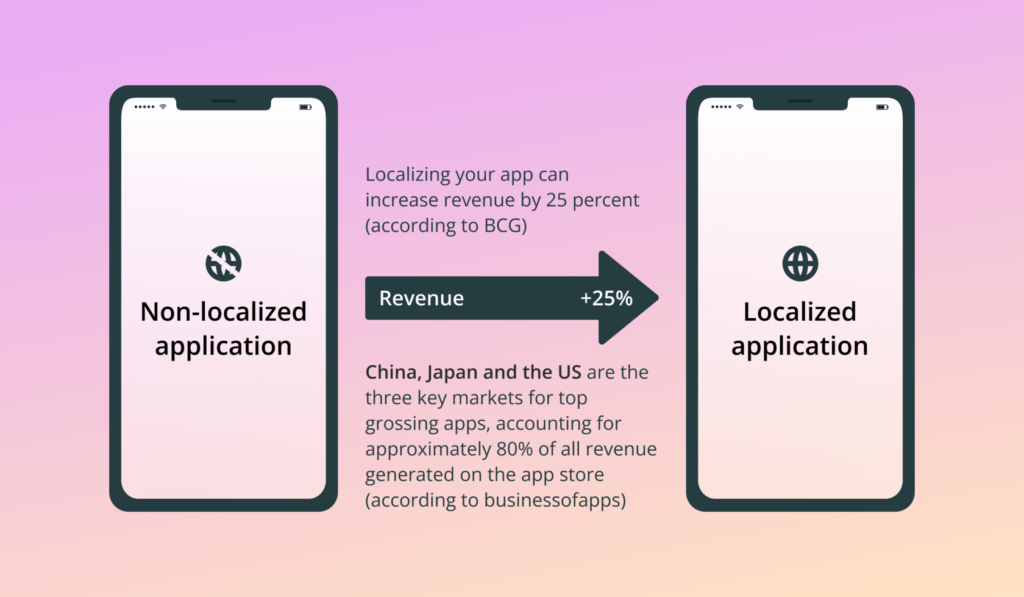
Remember that your approach to app localization will differ for each unique application and evolve based on your product’s current needs. With that said, deciding on countries for localization at the earliest stages of your app life circle is a wise decision. To save your precious time, make the most of solid tools for localization. That’s where Asolytics is sure to come in handy.
The Perks of Using Dedicated Tools for Localization
To seamlessly integrate your localization process within your development team’s agile workflow, make the most of the Asolytics localization tools. They come with the following major benefits:
- Automating Processes. By eliminating manual tasks, you make the entire operation faster and easier
- Saving Money. Automation is a cost-effective alternative to manual workflows as it boosts productivity.
- Keeping It All Consistent. Dedicated app localization tools prevent inconsistencies from creeping into the app.
- Enhancing Localization Quality. Features that suggest automatic keyword collection and their use for multiple locales contribute to effective, high-quality app localization results.
- Saving Your Precious Time. Utilizing dedicated app localization tools saves time and effort compared to manual processes, enabling your app to reach a global audience more swiftly.
How to Localize Your App With Asolytics
Asolytics added new tools, and now, the service offers a full-stuck approach for localization. By following two main steps — collecting keywords in different languages and applying those keywords for different locales — developers can significantly enhance their app’s downloads.
- Collect keywords in different languages
The first step in localizing your app with Asolytics is to collect keywords for the needed country. Asolytics provides tools for comprehensive keyword research that enables you to identify the most relevant and popular keywords in specific countries. Keywords you’ll get for the particular country display the specifics of the local market and the search behavior of users there. Collecting keywords in different languages will enable you to use them for different locales later.
Add Recommended and Autosuggested keywords to the Tracking Keywords – this is where your semantic core is kept. You can always come back to check the metrics of the keywords you have in your app’s semantic core and adjust your app text assets accordingly. Monitoring keywords from time to time is highly recommended in terms of ASO.
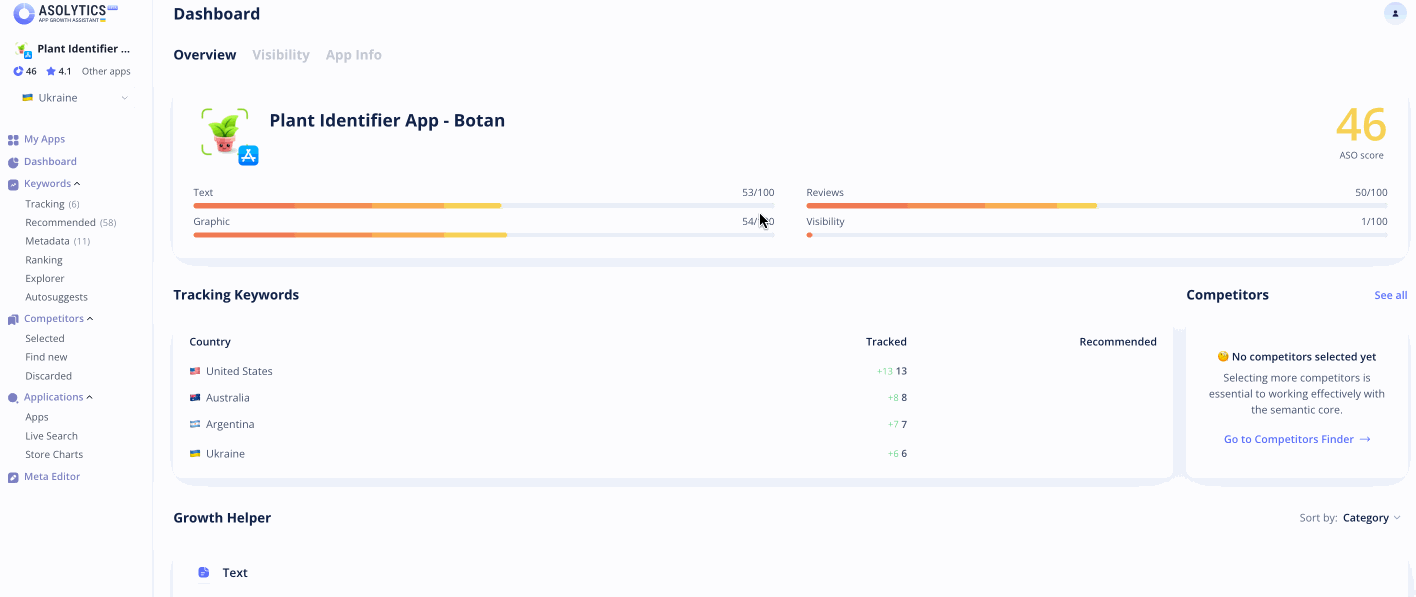
- Apply keywords for different locales in the specific country
Once the keywords for different countries have been collected and the semantic core has been formed, the second step is to apply those keywords to different locales in a specific country. Asolytics simplifies this process by providing Meta Editor for effective metadata optimization and app localization. With this tool, you can optimize the app title and description specifically for each locale of the chosen country.
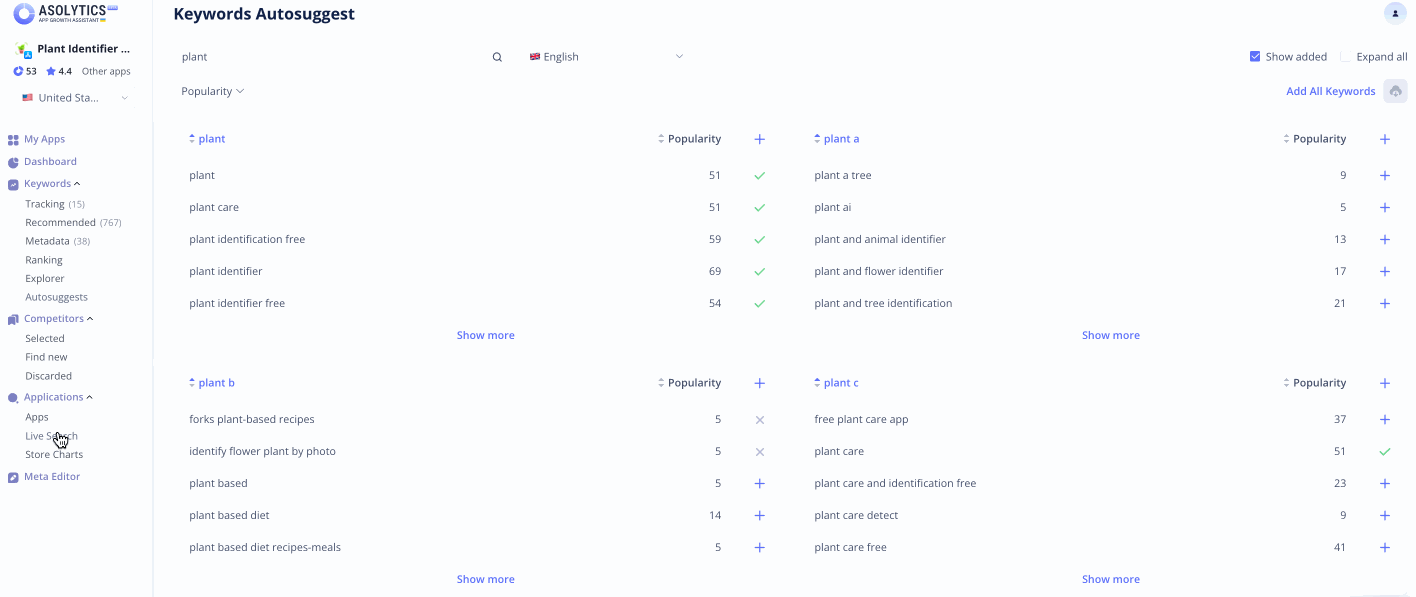
To Wrap Up
By making the most of Asolytics’ localization capabilities, you can significantly enhance your app’s performance on a global scale. The platform’s keyword research provides you with the necessary insights to understand your potential customers better and tailor your app’s content accordingly. This results in a more personalized and relevant user experience, ultimately driving higher installs, engagement, and overall success in different countries. Cutting to the chase, when it comes to learning how to increase app installs via localization and how to generally market your app like a pro, Asolytics is the answer.
FAQ
What is app localization?
App localization is adapting an application (app) to different app store locales; adapting to different languages and cultures, making it more suitable and appealing for users in different regions or countries.
What is an example of mobile app localization?
Airbnb supports more than 220 locales and more than 60 languages. They have localized every aspect: from the app’s user interface and content to the local payment methods. Thus, this app can be easily used in any country across the globe.
Why is app localization important?
App localization is important because it allows businesses to reach a global audience, cater to diverse user preferences, and enhance user experience. By adapting an app to different languages and cultures, it becomes more accessible, leading to increased user engagement and satisfaction. Localization helps businesses establish a presence in international markets, expand their customer base, and drive revenue growth.


